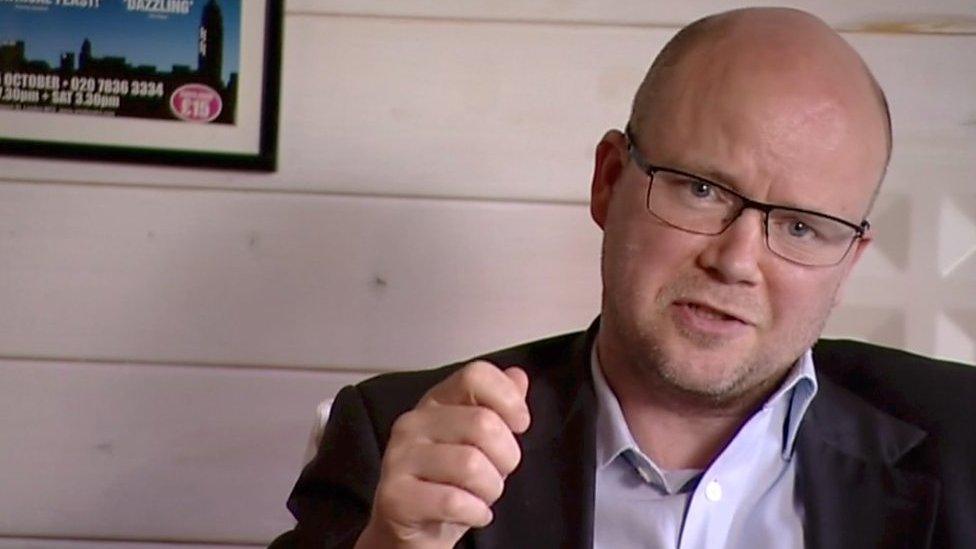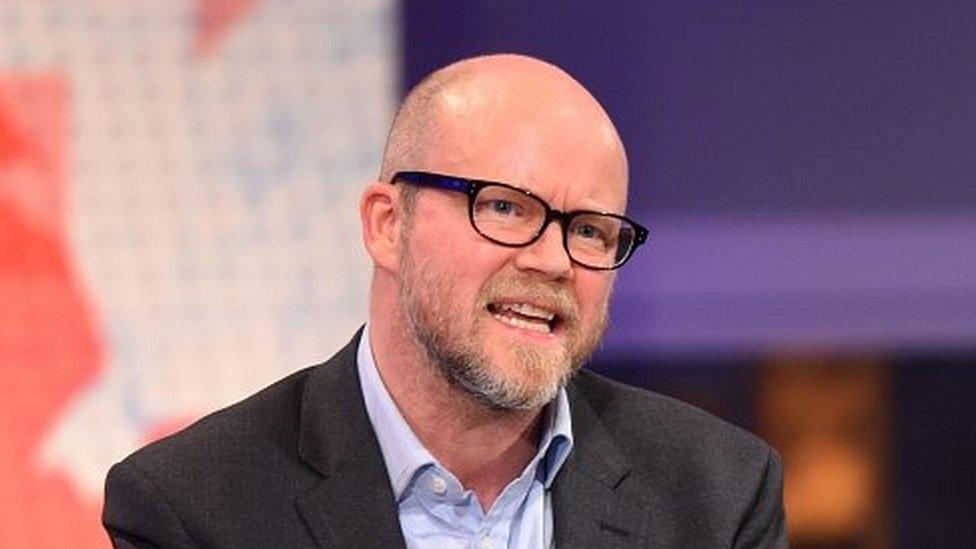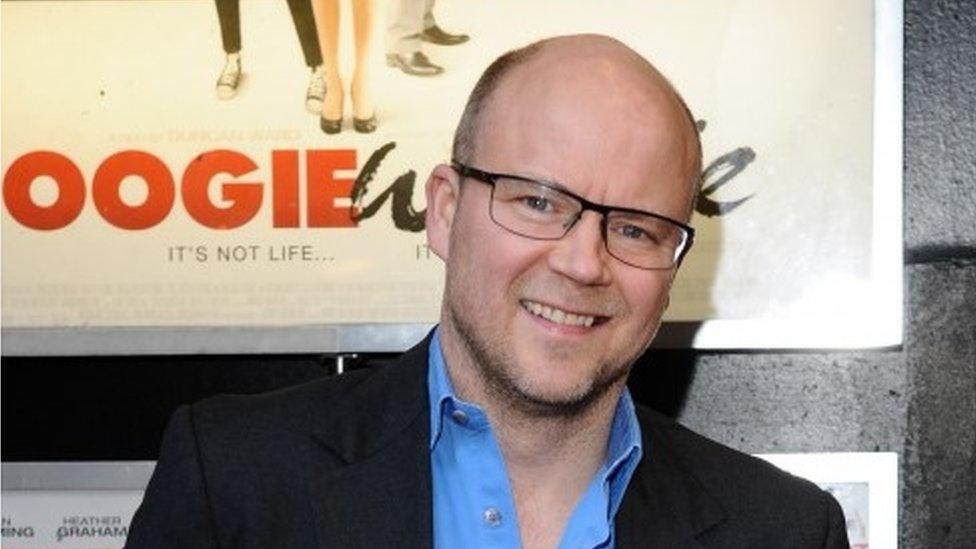'Avoidable mistakes made in appointment of Toby Young'
- Published
Toby Young: The man behind the tweets
Toby Young's reputation as a "controversialist" should have prompted greater scrutiny into his past before he was appointed to England's new university regulator, a probe has said.
Mr Young quit within days over some past "politically incorrect" remarks.
A report by the commissioner for public appointments, external criticised the Department for Education for failing to delve back far enough into his Twitter account.
Labour said it showed the Tories were failing universities and students.
The columnist was among a group of business executives appointed to the board of the Office for Students (OfS) last month to help lead the government's drive to apply market forces to higher education.
The report reveals that the then higher education minister Jo Johnson had asked officials to tell Mr Young about the vacancy, but added that after being alerted to the role Mr Young had "applied in the same way as other candidates".
The report says that Mr Young was then recommended for the job after a "very good" interview, although the then Education Secretary Justine Greening "questioned the proposed choice of Mr Young, particularly in terms of time commitment".
Commissioner Peter Riddell's report said there was "clear disparity" in the amount of checks made between different candidates, revealed political interference in decision-making processes and "serious shortcomings in terms of fairness and transparency" in respect of one of the appointments.
Ministers were forced to defend his appointment in the House of Commons following criticism from MPs, including prominent Tories, and a petition calling for him to be sacked gathered more than 220,000 signatures.
Students and academics also took to Twitter to call for Mr Young's removal, highlighting disparaging and crude remarks he has made about women's breasts in social media posts and a 1998 article for Gear magazine on "being a lesbian for the night".
'No secret'
The writer-turned-free school pioneer quit the OfS last month and apologised "unreservedly" for a string of controversial comments he had made online in recent years.
According to the report, the Department for Education admitted it had not trawled back far enough into his social media accounts and was unaware of the tweets by Mr Young - even though the social media accounts of the initially preferred candidate for the separate "student experience" role was "extensively examined".
"Due diligence was inadequate and not conducted in respect of all candidates on an equal basis, compromising the principle of fairness," the report stated.
It added: "Mr Young's reputation as a controversialist, in itself hardly a secret, should have prompted further probing to examine whether what he had said and done might conflict with his public responsibilities and standards expected on the OfS board.
"Second, the rapid disclosure of what were described as offensive tweets in the days after his appointment suggest that it was not that hard to find them - that not much delving was required."

Who is Toby Young?
Toby Young started out as a journalist founding the culture magazine Modern Review with Julie Burchill.
Following the collapse of the magazine he was recruited to work on Vanity Fair in New York, an experience that inspired his book "How to Lose Friends and Alienate People".
As a Spectator columnist, Mr Young made a number of controversial comments including a description of wheelchair ramps as part of "ghastly" inclusivity in schools.
In 2011 he set up the West London Free School which placed importance on discipline, ambition and "a competitive atmosphere".
He is director of the New Schools Network, the charity which people who want to open free schools are encouraged to use.

The commissioner, Peter Riddell, also said that email records mention "Number 10 Googlers" bringing the social media history of one candidate to the attention of a minister.
"Notably, no such exploration or research was made on other possible appointees, including Mr Young," he added.
Answering an urgent question on the appointment in the Commons, Education Minister Sam Gyimah admitted the social media vetting of Mr Young "wasn't as extensive as it could have been, given his 40,000 tweets or so".
Labour's shadow education secretary Angela Rayner demanded an immediate end to all-male appointment panels - after the report noted that these were used twice for the OfS.
The SNP's Alan Brown labelled the recruitment process a "blasé crony appointment system", while former shadow education secretary Lucy Powell branded the report "absolutely damning, particularly in relation to the former universities' minister and his role in this appointment".
Labour's David Lammy commented: "Toby Young believed in eugenics, he made terrible remarks about disabled people, he made awful remarks about women ... what confidence now should working class young people across this country have in the Office for Students if we have a government where the minister who did this cannot come to the despatch box, apologise or step down?"
Mr Gyimah conceded there were "issues here that are questionable", but he also urged MPs to have a "sense of perspective" about some of the "admirable and laudable" work carried out by Mr Young, which was "why he was considered to be a serious candidate for this job in the first place".
But the report also described how the decision to appoint one particular candidate to the board "was heavily influenced, not by the panel, but by special advisers, notably from 10 Downing Street".
Email records revealed a "desire" among ministers and special advisers not to appoint someone with close links to student unions, such as the National Union of Students, it added. That led to the preferred candidate for the student experience role being rejected.
'Lessons need to be learned'
In his findings, Mr Riddell concluded that the advisory panel did judge candidates on a fair, open and impartial basis, but said "avoidable mistakes were made".
"My investigation uncovered a number of areas where important principles in the Governance Code were breached or compromised in the appointments to the board of the Office for Students," he said.
"In my experience, this episode is unrepresentative of the hundreds of public appointments that take place each year, but it is important that lessons are learned - not least so that talented people from a wide range of backgrounds are willing to put themselves forward to serve on the boards of public bodies."
The Office for Students has been established to hold universities to account on issues like vice chancellors' pay and free speech on campus. It has powers to fine universities which fail to meet the required standards.
- Published9 January 2018

- Published2 January 2018

- Published3 January 2018
